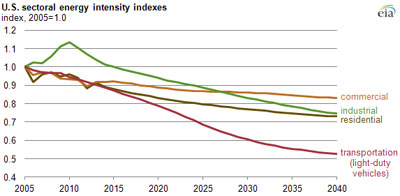Energy Efficiency is fast becoming part of the "business psyche" and energy management is considered an essential business strategy, according to a Deloitte survey.
Industries leading the way are technology, media, telecommunications and healthcare.
79% of businesses with more than 250 employees view reducing electricity costs as key to competitive advantage and 57% have formal energy reduction goals, up from 46% just last year.
Almost all – 93% – invested in energy management during the past three years – 17% of capital budgets this year.
They are moving toward energy independence, with 55% saying they generate some electricity on-site, up from 44% last year.
13% of the energy generated on-site comes from solar or wind, 9% from fuel cells, and 9% from combined heat and power.
"Based on the results of the 2014 study, we found that energy was becoming a core business competency. The findings of the 2015 study not only corroborate that result but further suggest a tipping point has been passed: thoughtful, deliberate energy consumption has permeated the business psyche, and companies, by and large, now consider energy management to be an essential aspect of corporate strategy."
Read our article, World Is Moving to Distributed Energy: 165 GW by 2023.
Manufacturers Can Do Much More
Although manufacturers are much more efficient – they use 17% less energy than in 2001, they still consume 24% of US energy, according to "Barriers to Industrial Energy Efficiency," by the Department of Energy.
The sector can cut energy use another 15-32% over the next 10 years through demand response and by incorporating efficient equipment such as advanced electric motors, lighting, sensors, controls, and combined heat and power.
In other words, most companies are still scratching the surface on efficiency.

Why? Not surprisingly, economic constraints are cited as the main reason, but they also don’t make it up on the priority list. Other reasons are perceived lack of returns and too much of a focus on short-term results.
Efficiency has yet to become ingrained in corporate strategy for industrial manufacturing.

